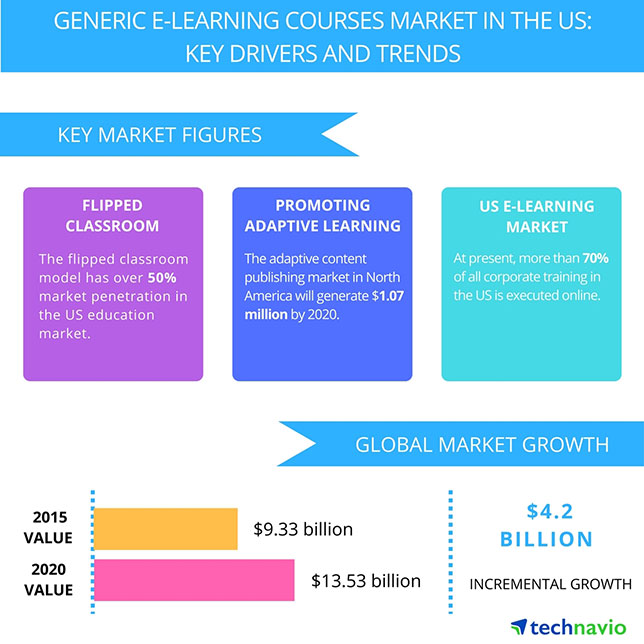Report: Flipped and Mobile Helping to Drive Growing Momentum in E-Learning Content and Courses
The
generic e-learning course market is projected to grow by 8 percent per year over
the next four years, driven primarily by growth in general purpose
learning applications, cost-effectiveness of generic e-learning courses
and increased adoption of mobile learning, according to a new report
from Technavio, a global technology research and advisory company.
The
company defines generic e-learning courses as standard courses on a
subject offered by service providers, educational institutions and
experts, and prepared according to the standard curriculum. The report,
"Generic E-learning Course Market in the U.S. 2016–2020,"
examines the current state of the generic e-learning course market in
the United States and forecasts trends over the coming years. The
report identifies City & Guilds Kineo, Macmillan Learning, Pearson Education and Skillsoft as the market leaders, although it also includes data from numerous other vendors.

According
to the report, one of the main reasons for the growth in generic
e-learning content and courses is the adoption of teaching and learning
methods such as the flipped classroom, blended learning and virtual
classrooms. "Generic e-learning courses have been incorporated across
all these methods as [they provide] learning opportunities in any kind of
learning methods," according to the company. "This
enables faculty and corporates to incorporate various hybrid and unique
learning and training methods."
Generic e-learning courses also
help educational institutions save money, according to the report. They
can use use these e-learning courses "to provide training on generic
concepts" and to "save costs while developing customized course content.
The
report identifies the proliferation of mobile devices on campus as the
third factor helping to drive adoption of these courses. “The
availability of gadgets such as e-book readers, tablets, and laptops,
coupled with better and uninterrupted Internet connectivity, has led to
a greater penetration of digital classrooms and e-learning products,"
said Jhansi Mary, a lead analyst at Technavio, in a prepared statement.
Vendors are increasingly offering mobile-compliant features to take
advantage of these devices and allow faculty and students to access
course content from anywhere, at any time.
Further information about the report can be found on Technavio's site.
About the Author
Leila Meyer is a technology writer based in British Columbia. She can be reached at [email protected].